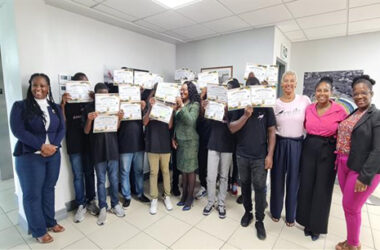
The Organisation of Eastern Caribbean States (OECS) observed its 41st Anniversary on June 18th, 2022 with celebrations held under the theme, ‘41 Years of Integration: Overcoming Challenges to Build Resilience and Sustainability.’
The activities in commemoration of the Anniversary included a Thanksgiving Service, OECS Colours Day and an Official Flag Raising Ceremony. The Thanksgiving Service was held at the St Benedict Catholic Church in Morne Fortune Castries on Monday June 13th, 2022.
The celebrations continued on Friday 17th June, with the OECS Colours Day. Individuals were encouraged to post their OECS coloured outfits via social media using the hashtag #OECSDAY . Widespread participation for Colours Day came from Schools, Ministries, businesses and citizens across the OECS, with many creative displays in celebration of the 41st Anniversary. The OECS Director General, Dr. Didacus Jules also led a team to engage in two school visits for Colours Day; at the Desruisseaux RC Combined School and the Grande Riviere Secondary School in Saint Lucia. During the school visits, students got the invaluable opportunity to learn about the OECS, and discuss its benefits to them and their country.
On Saturday June 18th 2022, the OECS Commission premiered an Official Flag Raising Ceremony in commemoration of the 41st Anniversary of the OECS.
The ceremony was addressed by the Right Honourable Dr. Keith Mitchell, Chairman of the OECS Authority and Prime Minister of Grenada. In his address, Prime Minister Mitchell spoke to the many achievements of the OECS, that ‘’ illustrate the strength and resilience of our integration movement, particularly in a global environment where the uniqueness and inherent vulnerabilities of Small Island Developing States, are not considered a priority for all.’’
He further challenged the region to overcome all future and unforeseen challenges, by remaining competitive, responsive and relevant. According to him,
‘’‘As we go into the future, our commitment to economic harmonisation and integration, protection of human and legal rights and the encouragement of good governance among our independent and non-independent countries remains embodied within our compass. With our Revised Treaty of Basseterre, we must continue to increase the runs on the scorecard and remain responsive, competitive and relevant.
We must also continue to embrace gender equity, inclusion, empowerment of youth, digital innovation and entrepreneurship as cross-cutting and essential features of our integration movement.’’
A week of OECS Commission Staff Appreciation activities from June 17th to July 1st will signal the end of celebrations for the 41st Anniversary of the OECS.
The Organisation of Eastern Caribbean States (OECS) is an International Inter-governmental Organisation dedicated to regional integration in the Eastern Caribbean. The vision of the organisation for 2020-2024 “A better quality of life for the people of the OECS” and Mission Statement: “To drive and support sustainable development through regional integration. collective action and development cooperation”.
The Organisation of Eastern Caribbean States came into being on June 18th 1981, when seven Eastern Caribbean countries signed a treaty agreeing to cooperate and promote unity and solidarity among the Members. The Treaty became known as the Treaty of Basseterre, named in honour of the capital city of Saint Kitts and Nevis where it was signed.
The 1981 Treaty was replaced in 2010 with a Revised Treaty of Basseterre, creating an economic union which is an agreement between countries where barriers to trade are reduced or removed for a single market with a customs union.
This Revised Treaty was signed on 18th June 2010 in Saint Lucia during the 51st Meeting of the Authority. The revised treaty established a single financial and economic space where goods, people and capital move freely. Also allows the harmonisation of monetary and governmental policies relating to taxes and revenue. The countries of this economic union continue to adopt a common approach to trade, health, education and the environment, as well as the development of critical sectors such as agriculture, tourism and energy.
The OECS is now an eleven-member grouping comprising of the full Member States of Antigua and Barbuda, Commonwealth of Dominica, Grenada, Montserrat, Saint Kitts and Nevis, Saint Lucia and Saint Vincent and the Grenadines. These members are part of the Economic Union and received the full benefits of Economic Union like free movement of people and goods, with the British Virgin Islands, Anguilla, Martinique and Guadeloupe as associate members of the OECS.





